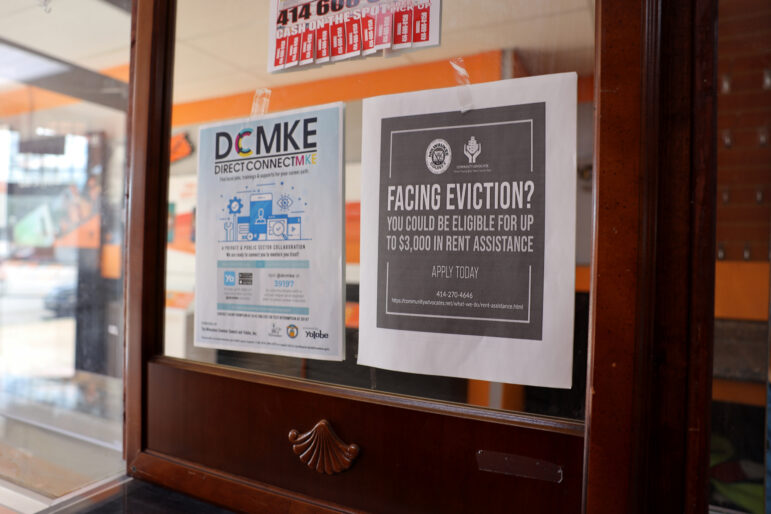National Eviction Moratorium Could Soon End
Federal judge struck down original order. The Justice Department is appealing the ruling.

A sign inside a Boost Mobile store on West Atkinson Avenue prompts residents to apply for emergency rental aid to avoid being evicted. Struggling Milwaukee tenants should seek help through rent assistance programs being administered by Community Advocates and the Social Development Commission. Photo taken Sept. 4, 2020 by Coburn Dukehart / Wisconsin Watch.
A federal judge on Wednesday tossed out the federal eviction moratorium, making it easier for landlords to kick out tenants behind in rent.
Here are some things you should know:
Wait. What happened Wednesday?
The U.S. Centers for Disease Control and Prevention originally enacted the halt on evictions to stem the spread of COVID–19, seasonal influenza and the increased risk of homeless shelters becoming overcrowded in fall and winter. It was set to expire June 30, but Congress has approved nearly $50 billion in rental assistance to fill the gap.
Judge Dabney Friedrich of the U.S. District Court for the District of Columbia said in her ruling that the CDC did not have the authority to impose the moratorium.
“It is the role of the political branches, and not the courts, to assess the merits of policy measures designed to combat the spread of disease, even during a global pandemic,” the ruling stated. “The question for the Court is a narrow one: Does the Public Health Service Act grant the CDC the legal authority to impose a nationwide eviction moratorium? It does not.”
It’s not completely clear.
Late Wednesday night, Friedrich put her ruling on hold until May 12. The move allows landlords who oppose a longer delay the chance to argue their case.
“Several court rulings have attempted to strike down the moratorium, but all had limited application,” Diane Yentel, president and CEO of the National Low Income Housing Coalition, said in a tweet. “While this ruling is written more starkly than previous ones, it likely has equally limited application, impacting only the plaintiffs who brought the case.”
OK. But is the moratorium still in effect or not?
The U.S. Department of Justice is appealing the ruling and requested an emergency stay on the order until a decision is made by a higher court. This means the moratorium remains in place for now, said Anthony Coley, the department’s director of public affairs.
What did the moratorium do anyway?
Tenants who have missed monthly rent payments were protected from being forced out of their homes if they declared financial hardship. It slowed but did not completely halt eviction filings. Milwaukee is still seeing hundreds of eviction filings each month but far fewer than in typical years, according to Eviction Lab.
George Hinton, the CEO of the Social Development Commission, or SDC, which works to help those in poverty, said his agency is closely monitoring the ruling and plans to advocate for tenants.
“If this decision does impact us here in Milwaukee, tenants will lose the protection they have and will be at the mercy of their landlords,” he said. “It’d put a lot of pressure on organizations like us, but either way we will continue to do our best and get applications processed as quickly as possible for those in need.”
The SDC received $6.7 million to assist residents of Milwaukee, Ozaukee and Washington counties through the Wisconsin Rent Assistance Program, or WRAP. The funds were provided as part of the federal Coronavirus Aid, Relief, and Economic Security (CARES) Act package. The SDC is now administering the Milwaukee Emergency Rental Assistance program.
“There is more to be sorted out, particularly on how the local courts will handle/interpret the ruling,” added Kristi Luzar the executive director of the Urban Economic Development Association of Wisconsin. “So, we are in communication with them and will wait to hear what’s in store there.”
What are landlords saying?
“We do not believe that this ruling will be the massive game changer in southeastern Wisconsin that some people fear, although that may occur in other states where funding is not being handled well and there is conflict instead of cooperation,” said officials representing the Apartment Association of Southeastern Wisconsin in a statement to NNS. “We will be sending a message out to our membership urging them to stay the course with pre-filing mediation and to continue to work diligently to help their renters apply and complete the application process for emergency rental assistance.”
“Until there is a conclusive answer on who this affects, the most prudent thing for people to do is to continue filing the declarations,” said Raphael Ramos, an attorney with Legal Action of Wisconsin and director of the Eviction Defense Project. (As explained in previous articles, tenants are still obligated to pay rent and must file a declaration form to your landlord to be covered under the order.)
Luzar said the consensus among partners of the Rental Housing Resource Center is that landlords should reach out for guidance before filing to evict; that they work with renters to apply for emergency rental assistance; and that they seek mediation services if needed.
Tenants should seek help through rent assistance programs being administered by Community Advocates and the Social Development Commission, and they should reach out to the Rental Housing Resource Center for other housing issues.
Resources to consult if you’re worried about eviction
- Community Advocates rent helpline: 414-270-4646
- Legal Aid Society of Milwaukee: 414-727-5300
- Mediate Milwaukee: 414-939-8800
- Legal Action of Wisconsin: 855-947-2529
- Social Development Commission: 414-906-2700
- Milwaukee Autonomous Tenants Union: 414-410-9714
This story was originally published by Milwaukee Neighborhood News Service, where you can find other stories reporting on fifteen city neighborhoods in Milwaukee.





















